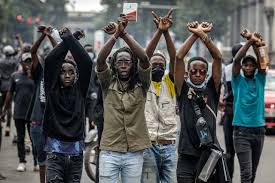
Dared to Dream: Ain’t we the Leaders? Kenyan youth continues agitating for good governance

In recent times, Kenya has experienced unprecedented bill proposals from members of parliament, particularly those closely associated with President William Ruto. A wave of protests is currently sweeping across Kenya. Triggered by controversial proposed tax increases, the movement has developed into a broader campaign for greater accountability in governance across the country. Some are calling for the resignation of the entire government.
The demonstrations began on 18 June and remained predominantly peaceful for a week; however, the situation escalated to violence in the early afternoon of 25 June. Several demonstrators crossed police barricades and entered the precincts of parliament. They ignited fires in portions of the building, vandalized legislators’ offices, and removed property, including the speaker’s mace.
Kenyan police, known for their well-deserved reputation for brutality, have recently faced sharp criticism for repeatedly deploying teargas at protesters and charging at them with batons, and they responded with live fire. On June 26, the Kenya National Commission on Human Rights reported that 39 individuals had been killed in the protests since their commencement.
The extraordinary events in the houses of parliament shocked the citizens of Kenya. President William Ruto, initially uncertain about whether to characterize the protests as having been hijacked by criminals or to promise dialogue with the participants, ultimately conceded and agreed to suspend the controversial legislation, known as the Finance Bill 2024, on June 26.
Despite the unforeseen victory, demonstrators pledged to continue their efforts and conducted protests on June 27 and July 2. Protesters have initiated a program of street action that will culminate on July 7 with a “national vigil” in honor of those who have lost their lives at the hands of the police. It is stated that while the finance bill sparked the protests, demonstrations were also fueled by a broader array of grievances regarding the governance of Kenya, including sharp criticism of well-compensated officials in the executive and parliament who are condemned for living in luxury while enforcing austerity measures on the public.
Kenyan youth have since then tirelessly advocated for a better Kenya, with the emergence of various civic education groups, community-based organizations, and civil society that continue to push for improvements in the country. Today, Parliament is looking to extend the presidential term limits, along with those of other elected officials, through what is known as the constitutional amendment bill.
In various ways, the youth, commonly referred to as Gen Z, are influencing the future of governance in Kenya.
In various ways, the youth, commonly referred to as Gen Z, are influencing the future of governance in Kenya.
